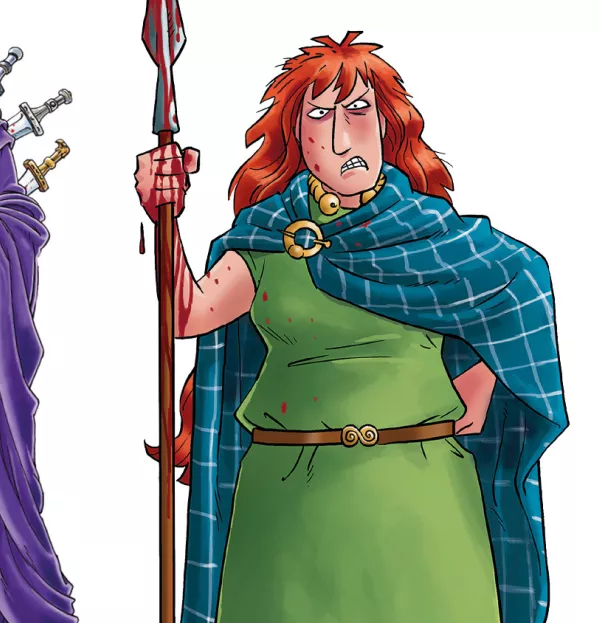Happy bloody birthday to Horrible Histories

Twenty-five years ago, Terry Deary put pen to paper to produce Terrible Tudors and Awesome Egyptians, the first of his famous Horrible Histories series. Instead of dreary dates and battles, he offered gore, sickness, disease and silly jokes, as well as cartoons by illustrator Martin Brown (a 17th-century preacher enforces the new Prayer Book at the point of two pistols and then wonders how on earth he’s going to turn the pages). The books started with tips on how to make your history teacher’s life just that little bit harder, not by putting drawing pins on his chair but, as Angry Aztecs puts it, by deploying the secret weapon that all history teachers fear: the simple question, “Why?”
Deary’s teachers are fusty old bodies with elbow patches who don’t tell you the fun facts because they don’t know them. Real teachers might feel a bit miffed at having all their years of work with sources, role play and interpretations brushed aside so airily, but Deary, a former teacher himself, was on a one-man mission to undermine what he saw as the stultifying effects of schools and curricula on children’s desire to learn. Horrible Histories was written to subvert: myths are exposed and long-forgotten details included, usually with a strong “yuk!” factor. Do you know what a leatherhead was in Stuart times? Or what Saxons thought thunder on a Wednesday portended? Neither did I. (Answers at the end of this article.)
Funny ’cause they’re true
Before Horrible Histories, the best-known comic treatment of school history was Sellar and Yeatman’s 1930 classic 1066 and All That, which spoofed the simplistic history teaching of their day, with events neatly divided into Good Things and Bad Things, leaving a confused, misremembered version in the memory. Horrible Histories treats the past with similar irreverence - Queen Victoria is “Queen Vic”, 1066 “was a funny old year” - but, despite the jokes, which are often of the dad variety, its purpose is ultimately serious: to open children’s eyes to the richness of the past.
The books might put the emphasis on pee, vomit, daft mistakes and stupid deaths, but there is plenty of more mainstream material in them, too: the idea is to spark children’s curiosity so that they read more detailed books when they are ready.
Deary’s approach proved a highly successful formula, and the initial Victorians and Tudors books were followed by a list of alliterative titles, such as Slimy Stuarts, Rotten Romans, Groovy Greeks, Stormin’ Normans and Barmy British Empire. As that last title suggests, underneath the jokes the books highlight the follies and cruelties of the past and the suffering of its victims. Where textbooks once trumpeted Britain’s imperial story, Deary’s verdict on Britain’s wars with the Maoris of New Zealand, for example, is bleak: “So who won? No one. Who lost? As usual, everyone.”
Born to rule
The books were soon joined by spin-off albums, annuals and board games and a sell-out stage version: those boring old history teachers proved surprisingly keen to organise school parties to catch the show at the theatre. In 2011, Lion Television translated the books into an award-winning TV formula, with sketches and songs spoofing familiar TV formats: Victorian ladies were obsessed with their appearance (“I went out without my parasol. Sobs.”) in “The Only Way is Hertfordshire”; Incan llama farmers starred in a low-budget TV commercial; while a pre-Facebook Henry VIII dealt with his marital and religious problems on MySpace. Regular features included the everpopular “Stupid Deaths”, “Historical Hospital” and sports reports from improbable-but-true historical touchlines (Georgian pinching contests, anyone?). However, the triumph of the TV series was undoubtedly its songs. Each one parodied a suitable musical genre (the Vikings as a 1970s heavy metal group, the four King Georges as a boy band); these were wittily written with videos good enough for the charts. Long before Hamilton put the rap into the American Revolution, Horrible Histories had produced “Spartan High School Musical” and given the wars of King Stephen and Matilda an Abba-style makeover.
Deary has retired but there is now a whole generation of people who encountered history through his creation, many of whom have become those self-same classroom history teachers he wanted to subvert.
Ironically, a book series written to challenge consensus ended up presenting a new consensus, with little room for alternative readings. The TV series takes this further, often following a sketch by announcing via a talking rat (I know, I know), “This is true,” even if it, well, isn’t. For example, Mary Tudor’s Kate Bush-style song, inspired idea though it is, puts forward a view of her reign that was overturned years ago.
The Horrible Histories books have sold more than 30 million copies worldwide; the TV series has won Baftas, and 2011 even saw a Horrible Histories prom, with “Bob Hale”, the demented Peter Snow-like presenter, outlining the story of the orchestra while Death (coo-ee!) enjoyed the Stupid Death of the composer Lully (he smashed his foot conducting with a great baton, caught gangrene and died, if you’re wondering).
No doubt someone will come up with a new way to subvert school history in the post-Gove era, but until that day comes, Happy Horrible Birthday, Horrible Histories.
Sean Lang is senior lecturer in history at Anglia Ruskin University and a former school history teacher
Awful answers
- In the 17th century, a “leatherhead” was a street mugger.
- A thundery Wednesday in Saxon times portended the death of lazy women.
You need a Tes subscription to read this article
Subscribe now to read this article and get other subscriber-only content:
- Unlimited access to all Tes magazine content
- Exclusive subscriber-only stories
- Award-winning email newsletters
Already a subscriber? Log in
You need a subscription to read this article
Subscribe now to read this article and get other subscriber-only content, including:
- Unlimited access to all Tes magazine content
- Exclusive subscriber-only stories
- Award-winning email newsletters